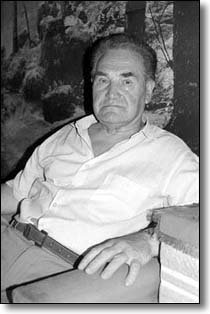|

Copyright © Reuters 1998
April 7, 1998
Argentina seeks arrest of Croat death camp suspect BUENOS AIRES, The Argentine government petitioned a federal court on Tuesday for the arrest of Dinko Sakic, a 76-year-old Croat accused of heading the Jasenovac concentration camp where Serbs, Jews and Gypsies were murdered in World War Two.

Victor Ramos, head of the government's Institute Against Discrimination, Xenophobia and Racism, sent a request to a federal court on instructions of President Carlos Menem for Sakic's arrest on suspicion of ordering thousands of murders. He sent Reuters a copy of the request which asks Interpol for details of international arrest warrants against Sakic. The Croat's alleged dark history was revealed by Argentine television's Channel 13 in an investigation aired late Monday. Sakic and his wife Esperanza have lived openly in Argentina for the past 50 years. She told Reuters from the beach resort of Santa Teresita where they reside that her husband was "as innocent as a breast-feeding baby." The Croat told Channel 13 that he ran the camp from December 1942 to October 1944, when Croatia was ruled by the fascist Ustasha regime, puppet of Adolf Hitler's Germany. Jasenovac was known as the "Auschwitz of the Balkans" and up to 600,000 people were massacred there, while many Jewish Croats were deported from there to German Nazi death camps. Sakic, identified by Jasenovac survivors who saw tapes of his interview, said he ran it humanely: "When I was there no guard or administrator was allowed to so much as touch a prisoner. I'm not speaking about what it was like before or afterwards, but when I was there no one could touch anyone." Sakic's wife called the allegations "atrocious. It's such a huge lie. I'm distraught. After 50 years, they come up with atrocious things like this." She said her husband had gone to Buenos Aires "to see what is going on." The Simon Wiesenthal Center, a Jewish organization which hunts Nazi war criminals, said Jasenovac was one of the worst concentration camps of the war where 600,000 people, mostly Serbs and Gypsies but also 25,000 Jews, were massacred. Rabbi Abraham Cooper, associate dean of the Los Angeles- based Center, told Reuters he trusted Argentina would expel or extradite Sakic. The Wiesenthal Center plans an international campaign to get Croatia to put Sakic on trial for war crimes. "But getting Croatia to deal with the genocidal past of the Ustasha regime is difficult. We're going to ask German authorities to put pressure on Croatia to put him on trial. Failing that, we'll ask Germany to look at the possibility of trying him in Germany," he said. The Center sent Reuters a copy of its dossier on Sakic, which accuses him of taking part personally in gruesome killings and torture in Jasenovac and other Ustasha camps. The Peronist government has also ordered a probe into Sakic's presence in the country by its Commission for Clearing Up Nazi Activities in Argentina, set up in 1995 to atone for its infamous role as haven of Nazi war criminals. The fascist sympathies of populist post-war president Gen. Juan Peron and his wife Evita made Argentina the hiding place of top Nazis like Erich Eichmann and Martin Bormann. "President Peron and Evita personally helped us," Sakic told Channel 13. Argentina was also the refuge of notorious Ustasha leader Ante Pavelic, until an assassination attempt in 1957 after which he fled to Spain. He died there in a monastery two years later. But Cooper said Argentina's extradition of two Nazis in recent years -- Franz Schwamberger in 1987 and Erich Priebke in 1995 -- showed "precedents exist on a legal and political level" for Sakic to be extradited, or at least expelled. Sakic has openly campaigned for Croatian independence and even met Croatian President Franjo Tudjman when he visited Buenos Aires in 1994. Tudjman, who came to power in 1990, is accused of having an ambiguous stance on Croatia's Nazi past. |